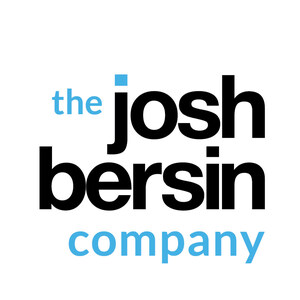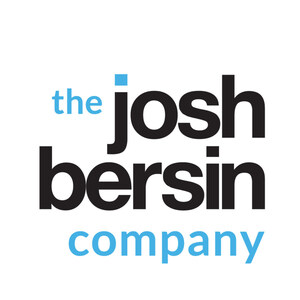- Major new research from The Josh Bersin Company spotlights where U.S. healthcare must refocus organizational redesign efforts to reverse the effects of the Great Resignation, impending retirement boom, and attrition to plug a nursing gap due to exceed 2.1 million positions within 2-3 years
- High-performing healthcare organizations revealed to have more technical skills, transformation skills and systemic people management skills than their slower-adapting counterparts
- Thanks to automation and technology augmentation that absorb tasks not specific to nursing (i.e. admin and medication delivery), healthcare providers need 20% fewer nurses today and offer more fulfilling work
- New Global Workforce Intelligence Project uses the world's largest database of information on job roles, skills, career pathways, and HR program maturity, reflecting the real workforce and HR practices in 10s of thousands of companies globally, and features interviews with top healthcare leaders
OAKLAND, Calif., Sept. 14, 2022 /PRNewswire/ -- The Josh Bersin Company, a research and advisory firm focused on HR and workforce strategies, has published groundbreaking research, revealing the real extent to which U.S. healthcare organizations must radically adapt to reverse the effects of mass resignations, impending retirements, a shortage of new nurses entering the field, and an aging population in need of more care.
While the study, The Global Workforce Intelligence (GWI) Project, shows the gap in nursing may only register as a net new demand of 200,000 nurses, market factors will create an actual gap of more than 2.1 million care providers by 2025. In response, analyst Josh Bersin and team recommend a combined approach of systemic people solutions and extensive organizational redesign to address the problem.
Troublingly, the standard approach of recruiting, retaining and reskilling employees is revealed by the research to be woefully insufficient to resolve the projected talent shortage—and will leave approximately 800,000 critical roles open. The study concludes that technological automation, human augmentation, and the reengineering of clinical delivery to reduce the demand for nursing will be among the solutions needed.
The study also shows that high-performing healthcare organizations have four to five times more transformation/organizational redesign and technology roles than their less advanced counterparts, and have invested in software development rather than individual tech solutions. The GWI Project found that advanced healthcare systems need 20 percent fewer nurses and administrative roles to deliver patient care.
The findings from the GWI research are qualitative as well as quantitative, deep-diving into emerging best practice through AI-enabled database analysis and interviews with CHROs of top U.S. healthcare companies, including Providence Health, Bon Secours Mercy Health, and Stanford. This is the first time that this methodology, which uses Eightfold's talent intelligence, has been applied on such a vast scale in the healthcare sector.
Key findings suggest that:
- Up to 48 per cent of the work required to successfully close gaps in clinical capability today could be achieved through redesign of work, jobs, and employment models, rather than traditional approaches to recruiting and training people
- Healthcare organizations that have invested in more strategic, transformative, organizational change skills—including IT-enabled business process redesign skills—already have a 20 percent lower need for nurses compared to the industry average
- Most organizations do not have the internal structure or expertise to redesign work. That's a problem because according to this research, up to 1 million nursing jobs can be streamlined through automation, technology enablement, or offloading work to non-clinical workers.
"The findings are groundbreaking in their scale and in their unequivocal implications. If healthcare organizations continue doing what they've always done, they simply won't be able to close the current resource gap. They need to change the work itself, redesign employment models, and rethink how people are deployed to opportunities. And, rather than implement point technology systems to help process existing workloads, there needs to be more ground-level reinvention of healthcare process and tasks and smarter use of digital alternatives to automate or augment more of the everyday work of key people."
"The labor shortage is a real crisis for healthcare. We can't address it if we don't think and act fundamentally differently. Beyond attracting, developing, and retaining talent in new ways, we need to fundamentally transform the work. This means deconstructing every role and operational process to its lowest level to determine how we might improve our caregivers' experience while optimizing capacity, cost, quality, and our patients' experience. It requires the digitization of simple, automatable tasks and the use of AI to better predict demand and manage talent deployment. And, it compels us to think about diversifying sources of talent to expand the available healthcare workforce. These aren't solutions one healthcare company can solve by itself. But, together, our industry can continue to thrive, creating health for a better world."
"Most healthcare organizations are very advanced in recruiting new people because turnover of nurses and other clinicians has been incredibly high, and healthcare used to be considered a decade behind other industries in its ability to manage people and talent. Now, driven by necessity, we see more innovation and strategic practices than in any other industry. Building career pathways within and outside of the organization, fostering health and wellbeing of nurses to retain them in the industry, and holistically redesigning work, jobs, and organizational models are all part of the solution. Without a doubt, healthcare is at a crossroads, and the c-suite needs to collaborate to address the clinical capacity issue together."
The Josh Bersin Company, through workforce strategies and approaches and maturity by industry, coupled with C-level conversations with hundreds of executives, provides detailed insights into how companies in a given market sector are advanced or behind in addressing a whole series of business challenges. In the current analysis, The Josh Bersin Company's analysts took this data set and "rolled it backwards" to see how various nursing roles are growing or shrinking in the workforce. The team determined that this workforce segment will be dramatically short in the next three years and identified what potential groups could be recruited, retained, reskilled, and which roles redesigned to fill this gap.
A final perspective compares and contrasts trends and outcomes between subdomains of an industry, or between vertical sectors, distilling what the most advanced employers look like vs. the rest of the industry.
Where most other HR research draws on limited payroll data, job postings and/or small survey samples, the Global Workforce Intelligence (GWI) Project uses Eightfold's extensive talent intelligence database combined with The Josh Bersin Company's comprehensive global HR leadership insights to understand jobs, job roles, skills, and career pathways, as well as organizational data. Combined, the dataset reflects the real workforce and HR practices actively in use today in healthcare (and other sectors) and what will potentially be essential in the future, across tens of thousands of companies around the world.
"Industry leaders understand how difficult it is to make accurate talent decisions without fully understanding the skills, capabilities, and trends in which every organization needs to evolve to be successful," said Kamal Ahluwalia, President at Eightfold AI. "Using Eightfold AI data to contribute to the research of The Josh Bersin Company team is both a privilege and a route to immediate impact on today's workforce."
The in-depth GWI Project industry analysis will be unveiled in full at September 13-16's HR Technology Conference & Expo in Las Vegas, where Josh Bersin will present a keynote address.
To learn more about the Global Workforce Intelligence Project, visit joshbersin.com.
The Global Workforce Intelligence Project uses the world's largest AI-driven database of workforce job role, skills, career pathways, and HR program maturity. In addition to reviewing over 1.4 million people profiles of healthcare workers in more than 300 different companies, the GWI Project also features qualitative interviews from over 20 top healthcare organizations.
The Eightfold Talent Intelligence platform is a vast set of 2.1 billion employee profiles, enriched by public social data and company public data, arranged in a time series format. Using Eightfold AI's proprietary AI algorithms, all the publicly available employees in a given set of companies can be looked at over time, and deep learning applied to infer the job skills, job clusters/families, levels, and career pathways across that period. The data can be further interrogated by company, location, organization size, and a wide variety of other factors to find relationships. In healthcare, for example, it is possible to statistically compute the supply/demand for nurses and other clinical workers for the coming years. Salary data is being added for future analysis.
The Josh Bersin Company provides a wide range of research and advisory services, including a corporate membership program, to help HR leaders and professionals tackle the ever-evolving challenges and needs of today's workforce. The firm's research team covers all topics in HR, talent, and L&D, including diversity, equity, and inclusion; employee experience; remote and hybrid work; wellbeing; HR strategy and capabilities; learning and career mobility; HR technology; organization design and development; and talent acquisition and mobility. With the Global Workforce Intelligence (GWI) Project, The Josh Bersin Company also serves to expand its support of market-leading businesses by helping them navigate the challenges of industry convergence while remaining future-focused.
Under the company's umbrella is the Josh Bersin Academy, the world's first global development academy for HR and talent professionals and a transformation agent for HR organizations. The Academy, which has seen more than 50,000 program enrollments since its 2019 launch, offers content-rich online courses, a carefully curated library of tools and resources, and a global community that helps HR and talent professionals stay current on the trends and practices needed to drive organizational success in the modern world of work. Visit www.joshbersin.com or email [email protected].
Eightfold AI's market-leading Talent Intelligence Platform™ helps organizations retain top performers, upskill and reskill their workforce, recruit talent efficiently, and reach diversity goals. Eightfold's patented deep learning artificial intelligence platform is available in more than 155 countries and 24 languages, enabling cutting-edge enterprises to transform their talent into a competitive advantage. For more information, visit www.eightfold.ai
SOURCE The Josh Bersin Company

WANT YOUR COMPANY'S NEWS FEATURED ON PRNEWSWIRE.COM?
Newsrooms &
Influencers
Digital Media
Outlets
Journalists
Opted In





Share this article